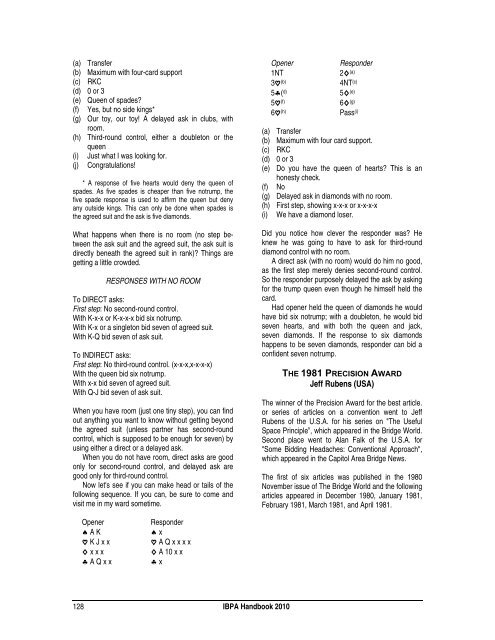Handbook - International Bridge Press Association
Handbook - International Bridge Press Association
Handbook - International Bridge Press Association
You also want an ePaper? Increase the reach of your titles
YUMPU automatically turns print PDFs into web optimized ePapers that Google loves.
(a) Transfer<br />
(b) Maximum with four-card support<br />
(c) RKC<br />
(d) 0 or 3<br />
(e) Queen of spades?<br />
(f) Yes, but no side kings*<br />
(g) Our toy, our toy! A delayed ask in clubs, with<br />
room.<br />
(h) Third-round control, either a doubleton or the<br />
queen<br />
(i) Just what I was looking for.<br />
(j) Congratulations!<br />
* A response of five hearts would deny the queen of<br />
spades. As five spades is cheaper than five notrump, the<br />
five spade response is used to affirm the queen but deny<br />
any outside kings. This can only be done when spades is<br />
the agreed suit and the ask is five diamonds.<br />
What happens when there is no room (no step between<br />
the ask suit and the agreed suit, the ask suit is<br />
directly beneath the agreed suit in rank)? Things are<br />
getting a little crowded.<br />
RESPONSES WITH NO ROOM<br />
To DIRECT asks:<br />
First step: No second-round control.<br />
With K-x-x or K-x-x-x bid six notrump.<br />
With K-x or a singleton bid seven of agreed suit.<br />
With K-Q bid seven of ask suit.<br />
To INDIRECT asks:<br />
First step: No third-round control. (x-x-x,x-x-x-x)<br />
With the queen bid six notrump.<br />
With x-x bid seven of agreed suit.<br />
With Q-J bid seven of ask suit.<br />
When you have room (just one tiny step), you can find<br />
out anything you want to know without getting beyond<br />
the agreed suit (unless partner has second-round<br />
control, which is supposed to be enough for seven) by<br />
using either a direct or a delayed ask.<br />
When you do not have room, direct asks are good<br />
only for second-round control, and delayed ask are<br />
good only for third-round control.<br />
Now let's see if you can make head or tails of the<br />
following sequence. If you can, be sure to come and<br />
visit me in my ward sometime.<br />
Opener Responder<br />
♠ A K ♠ x<br />
K J x x A Q x x x x<br />
x x x A 10 x x<br />
♣ A Q x x ♣ x<br />
128 IBPA <strong>Handbook</strong> 2010<br />
Opener Responder<br />
1NT 2 (a)<br />
3 (b) 4NT (c)<br />
5♣( d) 5 (e)<br />
5 (f) 6 (g)<br />
6 (h) Pass (i)<br />
(a) Transfer<br />
(b) Maximum with four card support.<br />
(c) RKC<br />
(d) 0 or 3<br />
(e) Do you have the queen of hearts? This is an<br />
honesty check.<br />
(f) No<br />
(g) Delayed ask in diamonds with no room.<br />
(h) First step, showing x-x-x or x-x-x-x<br />
(i) We have a diamond loser.<br />
Did you notice how clever the responder was? He<br />
knew he was going to have to ask for third-round<br />
diamond control with no room.<br />
A direct ask (with no room) would do him no good,<br />
as the first step merely denies second-round control.<br />
So the responder purposely delayed the ask by asking<br />
for the trump queen even though he himself held the<br />
card.<br />
Had opener held the queen of diamonds he would<br />
have bid six notrump; with a doubleton, he would bid<br />
seven hearts, and with both the queen and jack,<br />
seven diamonds. If the response to six diamonds<br />
happens to be seven diamonds, responder can bid a<br />
confident seven notrump.<br />
THE 1981 PRECISION AWARD<br />
Jeff Rubens (USA)<br />
The winner of the Precision Award for the best article.<br />
or series of articles on a convention went to Jeff<br />
Rubens of the U.S.A. for his series on "The Useful<br />
Space Principle”, which appeared in the <strong>Bridge</strong> World.<br />
Second place went to Alan Falk of the U.S.A. for<br />
"Some Bidding Headaches: Conventional Approach",<br />
which appeared in the Capitol Area <strong>Bridge</strong> News.<br />
The first of six articles was published in the 1980<br />
November issue of The <strong>Bridge</strong> World and the following<br />
articles appeared in December 1980, January 1981,<br />
February 1981, March 1981, and April 1981.


